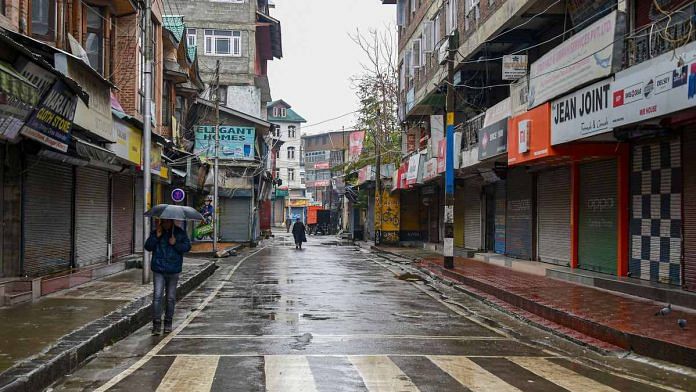New Delhi: Sheikh Ashiq Ahmad, president of the Kashmir Chamber of Commerce and Industry, has claimed that the internet restrictions imposed in the region since 5 August last year, and then the Covid-induced lockdown, have caused an economic loss of Rs 40,000 crore in the Valley alone, and that more than five lakh people across sectors are now jobless.
Ahmad told ThePrint the industries hit the hardest by the internet restrictions were tourism, transport and handicrafts, and they were just about beginning to pick up in December and January, before the pandemic swept in, pulling down business yet again.
“Internet is a basic need and we have been deprived. During the pandemic, children are also suffering — even my children have online classes, and sometimes the video works on 2G and sometimes it does not,” Ahmad said.
“For export-oriented businesses like handicrafts, they rely on sending inventory files to clients on WhatsApp. You try sending files on 2G and see how difficult it is,” he said.
The internet shutdown in Jammu and Kashmir was imposed on 4 August last year, a day before the special status of the state under Article 370 of the Constitution was scrapped. The region got 2G internet access in January after the Supreme Court instructed relevant authorities to review orders suspending the internet.
However, 2G internet has not done much to improve the quality of life in J&K during this Covid-19 pandemic, especially because high-speed 4G internet is at least 20 times faster than 2G, and has become the lifeline that keeps the global economy running.
Due to its slow speed, 2G internet makes watching and uploading videos online, making online payments, or submitting online applications nearly impossible, and in general, discourages many users from trying to use the internet for anything other than simple things like sending a text message on WhatsApp.
Also read: How Kashmir internet shutdown has hit Valley industries hard
‘The govt’s dilemma’
India has been labelled the “internet shutdown capital of the world” for ordering the most number of internet shutdowns since 2015, according to a 2020 report by New York-based digital rights organisation Access Now.
The report said in 2019, of the 213 internet shutdowns imposed across the world, India ordered 121, while Venezuela was number two with just 12 instances.
On the internet shutdown in J&K, especially Kashmir, Access Now stated that it was the second longest shutdown of the year at 175 days, behind one ordered by Myanmar.
An internet shutdown tracker run by Delhi-based digital rights organisation Software Freedom Law Centre showed that since 2012, there have been 433 internet shutdowns in India, of which 226 were in Jammu and Kashmir.
So far in 2020, there have been 55 shutdowns in India, with 46 of them in Jammu and Kashmir, and 38 in Kashmir alone.
Rajat Kathuria, director of the Indian Council for Research on International Economic Relations (ICRIER) told ThePrint: “The government is on the horns of a dilemma. The threat to internal security has escalated and, in their thinking, no economic cost is too high to pay for maintaining peace and the integrity of our borders.
However, Kathuria added: “The costs will be high, especially when the internet has become a channel for earning — both to maintain existing sources and a channel for new models of earning.”
Kathuria led a 2018 ICRIER report on the economic impact of internet shutdowns, which found that between 2012 and 2017, the economic cost of internet shutdowns in India was $3.04 billion, with the cost to the J&K economy alone being worth over Rs 4,000 crore.
“The question is how to balance the trade-off. One way could be to enforce the shutdown when it is absolutely necessary and for limited periods,” Kathuria said.
However, a 2019 working paper titled ‘Of Blackouts and Bandhs: The Strategy and Structure of Disconnected Protest in India’ by Jan Rydzak, currently a research analyst at US-based organisation Ranking Digital Rights, said: “State authorities invariably claim that these deliberate blackouts, which occur more frequently in India than in any other country in the world, are useful in pacifying or preventing protest. However, empirical evidence is never presented.”
Also read: Modi govt doesn’t have too many options to boost Jammu & Kashmir’s economy




India has lost Kashmir……….just like Brits lost India…………!!!!
Kashmiri Sunni Muslims are shameless traitors parasites who have been living off the alms provided by the rest of Hindu India. They get all the benefits, more than any other state but then love Pakistan and indulge in terrorism. This can’t go on. Sunnis must abandon their satanic cult and embrace Sanatan Dharma.
Did Kashmir produce anything besides, fruits, vegetables and terrorists? It lived off the money of tax payers of rest of India, without giving their dues to Ladakh and Jammu. Kashmiris have earned a lot by throwing stones.
What a pity. Turning out to be Demonetisation 2.0.